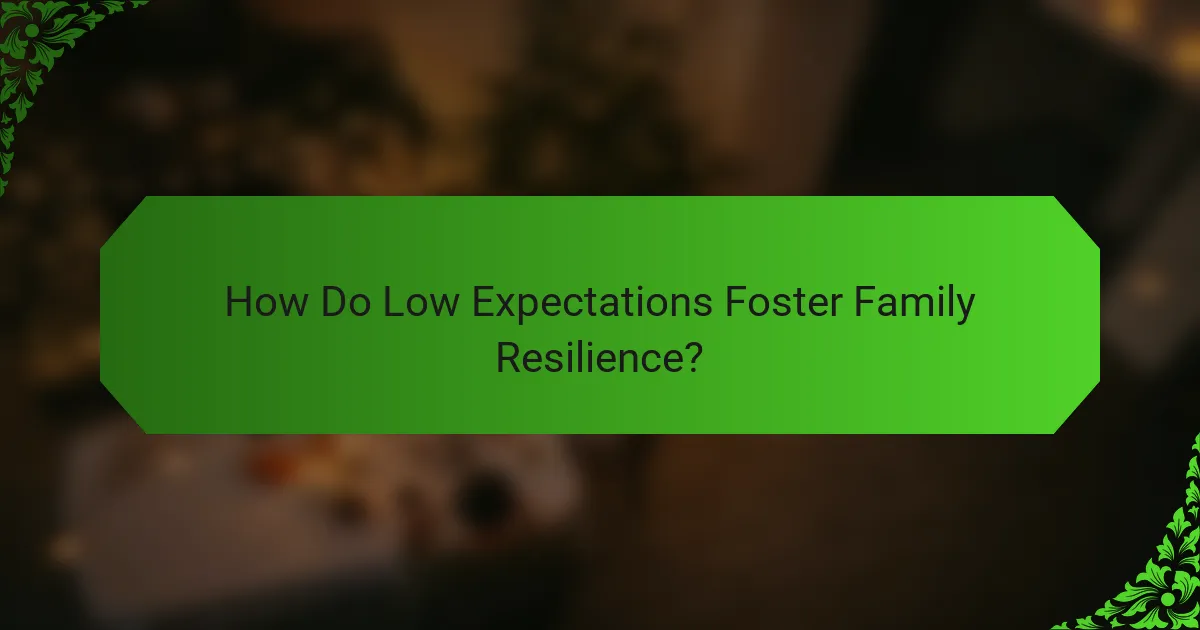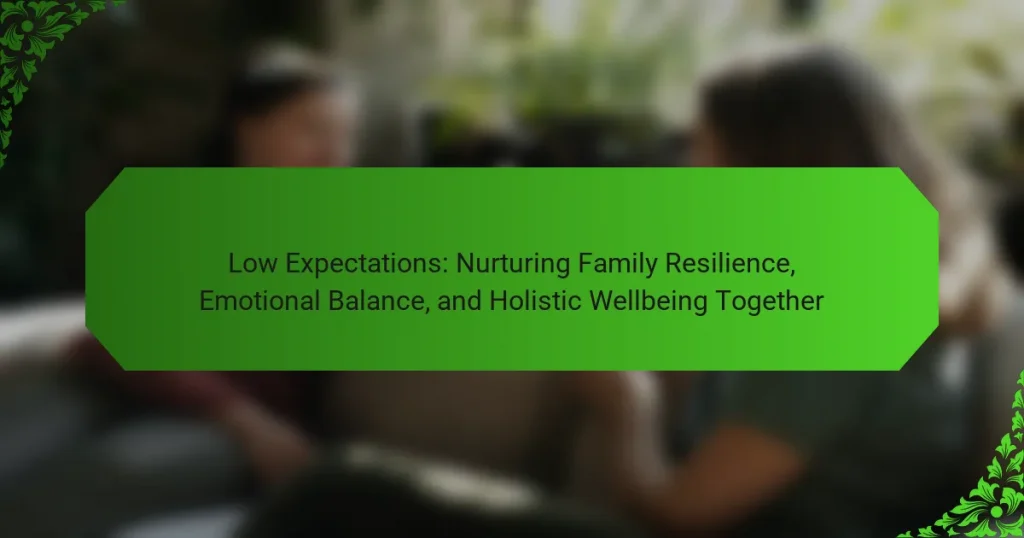Low expectations can significantly enhance family resilience and emotional balance. This article explores how embracing low expectations fosters supportive environments, encourages open communication, and promotes holistic wellbeing. It highlights the benefits of realistic goal-setting, mindfulness activities, and shared experiences to strengthen family bonds. By prioritising emotional health, families can navigate challenges more effectively and improve their overall quality of life.

How Do Low Expectations Foster Family Resilience?
Low expectations can enhance family resilience by fostering emotional balance and promoting holistic wellbeing. Families that embrace low expectations often cultivate a supportive environment, reducing stress and enhancing communication. This approach encourages adaptability and problem-solving, allowing family members to navigate challenges together more effectively. Research indicates that families with lower expectations experience less conflict and greater satisfaction, contributing to stronger bonds. By prioritising emotional health over perfection, families can thrive in unity and resilience.
What Are the Psychological Benefits of Low Expectations for Families?
Low expectations can foster resilience, emotional balance, and holistic wellbeing in families. This approach encourages realistic perspectives, reducing stress and disappointment. Families with low expectations often experience stronger bonds, as they focus on support rather than perfection. This mindset promotes a nurturing environment, enhancing overall family dynamics. As a result, emotional health improves, leading to greater satisfaction and stability within the family unit.
How Can Low Expectations Contribute to Emotional Balance?
Low expectations can foster emotional balance by reducing stress and enhancing resilience. When individuals set lower expectations, they minimise disappointment and cultivate acceptance. This mindset encourages a focus on present experiences rather than unattainable goals. As a result, families can strengthen their bonds and improve overall wellbeing. Embracing low expectations allows for a more adaptable approach to challenges, promoting emotional stability and harmony within family dynamics.
What Strategies Support Emotional Stability in Family Dynamics?
Low expectations foster emotional stability in family dynamics by reducing pressure and enhancing resilience. Families can cultivate emotional balance through open communication, shared activities, and mutual support. Setting achievable goals strengthens bonds and promotes holistic wellbeing. Regular family meetings can address concerns and celebrate successes, reinforcing a supportive environment.

What Unique Approaches Enhance Holistic Wellbeing?
Low expectations foster family resilience, emotional balance, and holistic wellbeing through open communication, shared experiences, and supportive environments. These approaches encourage realistic goal-setting, reducing stress and enhancing emotional connections. Families practising low expectations report increased satisfaction and stronger relationships, contributing to overall wellbeing. Engaging in mindfulness activities, such as yoga or meditation, further cultivates emotional balance, promoting a holistic approach to family dynamics.
How Do Family Rituals Promote Holistic Mental Health?
Family rituals significantly enhance holistic mental health by fostering resilience and emotional balance. These practices create a sense of belonging and security, which are crucial for well-being. Engaging in consistent rituals, such as family dinners or game nights, promotes communication and strengthens relationships.
Research indicates that families who partake in regular rituals report lower stress levels and improved emotional health. For instance, shared activities can lead to a unique attribute of collective identity, enhancing family cohesion. As a result, families develop a robust support system that nurtures individual and collective mental health.
Moreover, low expectations during these rituals allow for authentic interactions, reducing pressure and fostering a safe space for emotional expression. This approach cultivates an environment where family members feel valued and understood, ultimately leading to improved holistic well-being.
In summary, family rituals serve as a valuable tool for promoting resilience and emotional balance, contributing positively to overall mental health.
What Types of Family Activities Encourage Connection and Support?
Engaging in family activities that emphasise low expectations fosters connection and support. Activities such as cooking together, nature walks, and game nights encourage collaboration and emotional bonding. These shared experiences promote resilience and holistic wellbeing, allowing families to nurture emotional balance without the pressure of performance. Prioritising quality time over competition strengthens relationships and builds a supportive family environment.
What Role Does Communication Play in Nurturing Wellbeing?
Effective communication fosters family resilience, emotional balance, and holistic wellbeing. It strengthens bonds, encourages openness, and promotes understanding among family members. This nurturing environment allows individuals to express their feelings and concerns, leading to improved mental health and emotional support. Studies indicate that families who communicate well experience lower stress levels and enhanced coping mechanisms. By setting low expectations in communication, families can create a safe space for vulnerability, ultimately contributing to collective wellbeing.
How Can Families Improve Their Communication Styles?
Families can improve their communication styles by setting low expectations for conflict resolution and fostering emotional balance. This approach nurtures resilience and promotes holistic wellbeing. Open dialogue encourages family members to express feelings without fear of judgement. Regular family meetings can establish a safe space for sharing concerns and celebrating achievements. Practising active listening enhances understanding and empathy, creating stronger connections. Additionally, incorporating shared activities can strengthen bonds and improve communication dynamics.

What Rare Traits of Low Expectations Can Transform Family Life?
Low expectations can foster stronger family bonds, emotional stability, and overall wellbeing. Embracing low expectations allows families to focus on appreciation rather than disappointment, enhancing resilience. This approach encourages open communication and reduces stress, leading to healthier interactions. Families that prioritise emotional balance can navigate challenges more effectively, ultimately improving their quality of life together.
How Can Embracing Vulnerability Strengthen Family Bonds?
Embracing vulnerability can significantly strengthen family bonds by fostering trust and open communication. When family members share their feelings and fears, they create a safe environment for emotional expression. This practice nurtures resilience, allowing families to face challenges together.
Research indicates that families who engage in vulnerable conversations report higher levels of emotional balance and holistic wellbeing. By lowering expectations of perfection, families can connect on a deeper level, enhancing their relationships. Vulnerability encourages empathy, as members learn to understand each other’s experiences, ultimately leading to stronger family ties.
What Are the Long-term Impacts of Low Expectations on Family Dynamics?
Low expectations can lead to diminished family cohesion and emotional disconnection over time. Families may struggle with communication, resulting in unresolved conflicts and a lack of support. This dynamic can hinder resilience and overall wellbeing, as members may feel undervalued and disengaged. Research indicates that low expectations contribute to a negative feedback loop, where limited aspirations diminish motivation and personal growth. As a result, fostering an environment that encourages higher expectations can enhance family dynamics, promoting emotional balance and collective resilience.

What Practical Tips Can Families Implement for Lasting Change?
Families can implement low expectations to foster resilience and emotional balance. Start by setting realistic goals that encourage gradual progress. Prioritise open communication, allowing family members to express feelings without judgement. Establish routines that promote stability and predictability, enhancing overall wellbeing. Encourage shared activities that strengthen bonds, such as family meals or game nights. Lastly, practise gratitude regularly to cultivate a positive mindset and appreciation for small achievements.
What Common Mistakes Should Families Avoid When Setting Expectations?
Families should avoid setting overly low expectations, which can hinder growth and resilience. Common mistakes include neglecting individual strengths, failing to communicate openly, and not fostering a supportive environment. Recognising each family member’s unique attributes encourages emotional balance and holistic wellbeing. Additionally, avoiding comparisons with others can help maintain a positive family dynamic. Establishing realistic yet encouraging expectations fosters resilience and strengthens family bonds.
How Can Families Create a Balanced Environment for Growth?
Families can create a balanced environment for growth by setting low expectations, fostering resilience, and promoting emotional balance. This approach allows family members to thrive together, enhancing holistic wellbeing.
Encouraging open communication helps family members express their feelings and challenges. Regular family activities strengthen bonds and create a supportive atmosphere. Establishing routines provides stability, which is crucial for emotional security.
Mindfulness practices can be integrated into daily life, enhancing awareness and emotional regulation. Additionally, celebrating small achievements reinforces positive behaviour and builds confidence within the family unit.
By prioritising these strategies, families cultivate an environment that nurtures growth, resilience, and overall wellbeing. This holistic approach allows for individual development while fostering collective harmony.
What Daily Practices Foster a Supportive Family Atmosphere?
Low expectations foster a supportive family atmosphere by promoting resilience, emotional balance, and holistic well-being. Daily practices include open communication, shared responsibilities, and quality family time.
Encouraging family members to express feelings builds emotional intelligence. Regular family meetings create a space for sharing thoughts and concerns. Establishing routines, like family meals, enhances connection and stability.
Practising gratitude together strengthens relationships. Engaging in activities that promote well-being, such as exercise or mindfulness, contributes to overall family health. Celebrating small achievements reinforces a positive environment and nurtures resilience.




